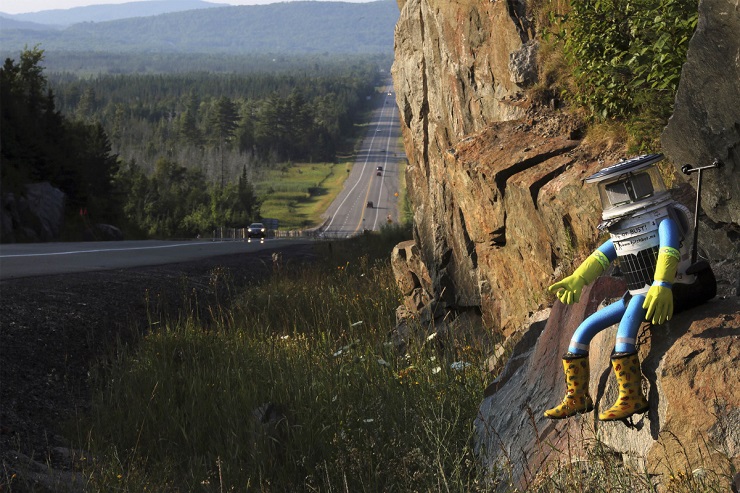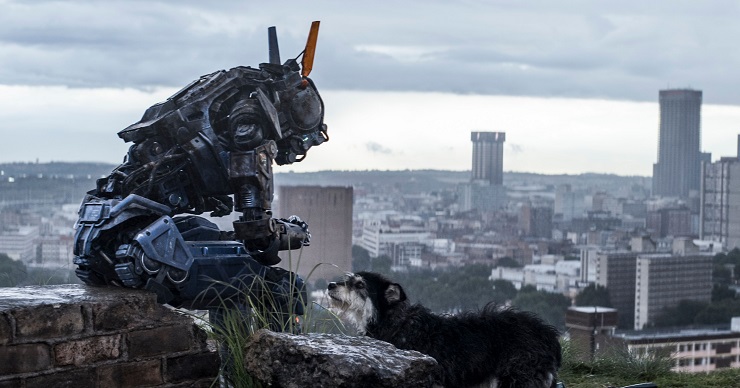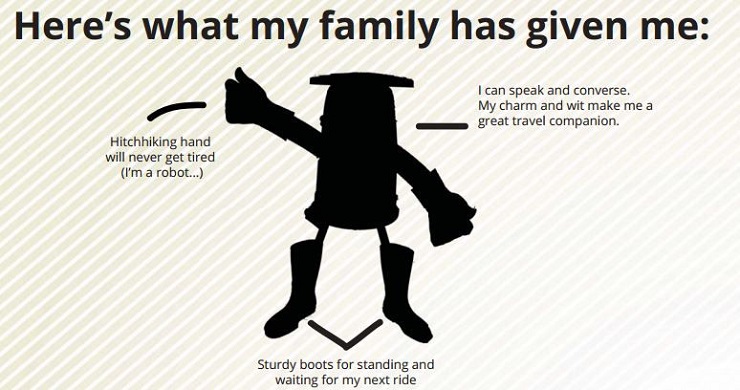HitchBOT, the hitchhiking robot, was viciously attacked and killed on Friday night in Philadelphia. Designed as a talking travel companion, HitchBOT was a social experiment that didn’t end well.

Every AI film you’ve ever seen has asked the same question at some point; what does it mean to be human and how do humans react to something trying to imitate humanity? Recent examples of AI films include Chappie and the critically acclaimed Ex Machina, which take very different approaches but broach the same discussions about human life and emotion. With the development of AI starting to gather pace, the same themes that have been explored in movies are being raised in real life.

While HitchBOT is not sentient it was created using Cleverscript, an artificial intelligence software created in the UK. ‘Born’ in Ontario, Canada to a big family of creators, he had made journeys across Canada and parts of Europe before starting its trek in America. Designed as a traveling companion that could provide numerous random factoids and limited conversation, HitchBOT was child sized and immobile, relying on others to transport it, pass it along or leave it where it’d be noticed. Co-Creator Frauke Zeller said it was interesting to see how people would respond to the experiment.
“We want to see what people do with this kind of technology when we leave it up to them.”
Many took kindly to the mechanic hitchhiker. HitchBOT was able to take in a Red Sox game, accompanied a metal band, and even spent some time at sea. However, in Philadelphia things went wrong. It seems not everyone was enamoured with the abrupt tone of HitchBOT, or maybe they were scared of it, or thought they could make some money off it’s electronics. Either way, HitchBOT was murdered, left decapitated and without arms, it’s brightly coloured gumboots a symbol of child-like innocence, adding substantial gravity to the scene. This real-life incident evokes thoughts of a sequence in the film Chappie.

The creators are being cautious with what they release to the public because HitchBOT was extremely popular with children who were following its progress online.

“Sadly it’s come to an end”, said Zeller. “I hope that people won’t be too disappointed, too sad.” The creators were unable to track HitchBOT’s exact location due to the damage it received but knew it was in Philadelphia somewhere. They released a statement saying:
“Sometimes bad things happen to good robots.”
They also vowed that the experiment wasn’t over and that the mission HitchBOT started would live on. They want to explore what can be learned from the experience and have no intentions of tracking down the people who vandalised HitchBOT, despite the head of HitchBOT being stolen.
For all the light-hearted reporting that the HitchBOT story is receiving, many would view it more seriously. Most films tend to predict humans won’t react well to robots and artificial beings entering their lives, and if this is any indication, the films are right. HitchBOT lasted 26 days in America, failing to progress beyond the north-east of the country. If people are willing to blatantly destroy a cute and harmless robot, what would they do if faced with a fully sentient creation? More often than not the answer is they would feel threatened and act accordingly.
If a properly intelligent robot is created, what are the limits to it’s abilities? Many experts are genuinely concerned about what the future holds if major breakthroughs are made with AI. Tesla boss Elon Musk declared AI to be the “biggest existential threat” facing mankind. Professor Stephen Hawking has also joined those worried about the future. Some, such as Prof. Nick Bostrom, of the University of Oxford believe we will experience an apocalypse at the hands of AI by the turn of the century. Murray Shanahan, professor of cognitive robotics at Imperial College is more circumspect.
“The AI community does not think its a substantial worry, whereas the public does think it’s much more of an issue. The right place to be is probably in-between those two extremes. I do not think we are about to develop human-level AI within the next 10-20 years. On the other hand its probably a good idea for AI researchers to start thinking about the issues that Stephen Hawking and others have raised.”
The fact is the concerns are there, being raised by respected figures who know what they’re talking about. That’s why the general public is also worried. If the experts are unsure about the potential of AI creations, then society has the right to be a little nervous. It’s the arguments around a workforce that could be replaced entirely by machines that are interesting. What happens when AI becomes so advanced that humans are surplus to requirements? It’s the reason so many films have been made exploring the issue. At what point does AI just become I? Is it the flesh and bone that makes a human, or the mind, the thoughts?
It will likely be a long time before we see any definitive answers on the topic. Until then we have the minds of filmmakers to give us a glimpse into the future, be it bleak or liberating. Check out a trailer for Ex Machina below, starring Oscar Isaac, which debates the humanity of a ‘female’ android.
How do you feel about Artificial Intelligence and what is your favourite AI film?







